Have you made the dreaded “trip of shame” to the grocery store to buy eggs when your ladies have slowed down in the winter? Ugh. Me, too! That is, until I discovered water glassing eggs!
Water glassing eggs is a simple, old-fashioned way to preserve eggs for long-term storage.
In this article, we’ll discuss everything you need to know about water glassing eggs, tackle any safety concerns and answer all of your questions!
If you are reading this during a high-production egg season (spring and summer), then now is the perfect time to incorporate water glassing!
Let’s jump in!
*Disclosure: This post may contain affiliate links to products (including Amazon). I’ll earn a small commission if you make a purchase through my link, at no additional cost to you! Regardless, I only link to products that I personally use on our homestead or believe in.
What Is Water Glassing Eggs?
Water glassing is a traditional, safe way of preserving eggs for long-term storage without the need for refrigeration! The process has been used since the early 1800’s and involves mixing pickling lime or sodium silicate in water and submerging eggs in the mixture.
While sodium silicate is the original product that was used in the 1800s, it’s also a concrete sealer and that just doesn’t feel right to me when we’re talking about food.
Today, most individuals use food-grade pickling lime (calcium hydroxide)! Yup; the same lime that you add to your home-grown pickles for that delicious crunch!
Eggs are naturally very porous. These additives work by sealing these pores, resulting in a well-preserved egg that won’t let any bacteria inside! Pretty cool, huh?
If you want a fun, quick read, check out this article on water glassing eggs from 1917!
Why Should I Preserve Eggs?
The main reason you should preserve eggs is to ensure that you have a steady supply during times of low production. Egg production typically peaks in the spring and is a great time to tuck those extras away for later.
Hens can stop laying eggs for many reasons:
- Low light exposure like in the winter months (chickens need 14 hours of daylight to keep laying)
- Stress from new flock members, changing environments, bullies, predators, you name it!
- Periods without food and/or water
- Illness, injury or disease
- Pests like mites and lice
Preserving extra eggs during productive months will ensure that you stiil have eggs to eat during the lean ones. This is an excellent step to maximizing your self-sufficiency, rather than needing to take that dreaded trip to the grocery store to pay for sub-par eggs.
There’s another reason why you might be out of eggs…
Predator pressure is a tragic, all-too-familiar issue for chicken keepers. If you have a sudden predator attack that kills some (or all) of your flock, this will immediately leave you without a supply of eggs. Having a supply of preserved eggs will provide you with many breakfasts until you’re able to rebuild your flock again.
Supplies for Water Glassing Eggs
Food-Grade Pickling Lime
As I mentioned above, you can use the traditional ingredient of sodium silicate (concrete sealer), however food-grade pickling lime (also called hydrated lime) feels like a better choice to me when we’re talking about food.
Pickling lime is easily accessible and is what most homesteaders use for water glassing eggs today. This product can often be found in the canning section of your local store; do not buy lime from the agricultural section as this is a very different product!! If you’d rather shop online, here’s the products that I recommend:
The Homesteading RD's Product Picks | |
If you're planning on water glassing in a 3 or 5 gallon container, then Azure Standard is the most economical way to get food grade lime in bulk. Click the link below to sign up! They offer 1 lb for $2.95, 3 lbs for $9.54 and 50 lbs for $52.19. | |
Amazon offers smaller 1 lb bags of food grade lime, however it costs a bit more at $13.05 per pound. A great way to just get started and see what you think of the process! | |
Kitchen Scale
You’ll be measuring out the pickling lime in ounces, so you’ll need a kitchen scale to get the ratio just right! If you don’t already have a kitchen scale, now is a great time to get one. You’ll be using it for other homestead skills such as making sourdough, weighing out microgreen seeds or even tracking egg weights during incubation.
The Homesteading RD's Product Picks | |
Multifunction Precision Kitchen and Food Scale helps you weigh your ingredients accurately in both grams and ounces! | |
Water
You’ll want to use water that is fluoride and chlorine free. If you are on well-water, then go ahead and use that! If you are on city-water, you’ll want to use filtered water or treat your tap water so that it’s purified (boil it or set it out for 24 hours).
Fresh, Clean, Unwashed Eggs
Here’s the really important part! You cannot use eggs from the grocery store. In the United States, the USDA requires all producers to wash their eggs before sale. When eggs are washed, they lose their protective bloom coating.
This bloom coating is essential for water glassing to work. Submerging fresh, clean, unwashed eggs in the pickling lime solution seals the bloom coating in place so that the egg is no longer porous.
This sealing action is what keeps bacteria and lime out, preserving the egg for long-term storage. If you tried to use washed eggs, the lime would easily leak through the pores of the egg and spoil the contents – yuck!
If you gather an egg that has some dirt or poop on it, eat it right away rather than trying to wipe or clean it off for water glassing storage.
Food-Grade Container
Most any container will work as long as it is a food-safe material. The size of container you choose depends on how many eggs you want to preserve!
- A 1 quart container will fit 15 eggs
- A 1 gallon container will fit 3 dozen eggs
- A 3 gallon container will fit 80 eggs
- A 5 gallon container will fit 130 eggs
Keep in mind that large containers are going to be heavy and hard to move. The danger in moving your container is that if one egg cracks, then your entire batch of eggs will be spoiled.
Glass Jar or Ceramic Crock
Glass jars or ceramic cracks are classic options that have been used since the early 1800s. While these types of containers can be expensive, I’ve found great deals while hunting at my local thrift and antique stores!
If you’d rather shop online, this is a great option (use the extras for dry good storage!):
The Homesteading RD's Product Picks: | |
Prefer to water glass your eggs in 1 gallon containers so they are easier to manage? No problem! This bundle of 4 one gallon jars is an excellent option! These jars would be excellent for homegrown pickles, too! | |
Food-Grade Plastic Bucket
If you’re planning to water glass a lot of eggs, this is probably the most realistic option. We go through a lot of eggs in our house, so I’ll be water glassing hundreds of eggs throughout the spring and summer to ensure that we can make it through the lean winter months.
Here’s some great options for 5 gallon food-grade buckets:
The Homesteading RD's Product Picks | |
Azure Standard offers the best bulk pricing when it comes to nearly everyting, 5 gallon buckets included! Sign up by clicking below.
| |
Amazon offers 5 gallon buckets as well, however they cost a bit more at $24.10 per bucket (with a lid!). | |
Slotted ladle
This is a must if you are using a large container like me. While lime is safe, it can be very drying to the skin if you dip your hand in there daily. Plus, the oils on your skin can contaminate the batch. Use a slotted spoon to reach in for your eggs.
Here’s the one I use:
The Homesteading RD's Product Picks | |
Made of highly polished 18/8 stainless steel for long-lasting use. This is the PERFECT sizes for ladling eggs in and out of your water glassing solution to protect your hands. | |
How to: Water Glassing Eggs
Step 1: Set out your supplies
See section above for details on each item!
- Clean container
- Fresh, clean, unwashed eggs
- Picking lime
- Room temperature water (filtered or distilled if you’re on city water)
- Kitchen scale
- Slotted ladle
Step 2: Mix 1 oz of pickling lime per 1 quart of water
This is the basic ratio and you can adjust it to whatever size container you are using. Mix well until the pickling lime is completely dissolved. It will look a lot like milk at first! Ensure that you have enough liquid to cover your eggs by 2 inches.
- 1 quart: 1 oz pickling lime
- 1 gallon: 4 oz pickling lime
- 3 gallons: 12 oz pickling lime
- 5 gallons: 20 oz pickling lime
Step 3: Gently add the eggs to the water glassing solution
It is very, very important that you add the eggs gently. If one egg cracks, then the entire batch is ruined. Try your best to place the eggs so that they are oriented pointy end down. You can do this by hand or by using a slotted ladle.
Tip #1: If you have sensitive skin, you may want to wear gloves to be safe. The lime solution is very alkaline and can be drying.
Tip #2: You can keep adding eggs on a daily basis until the container is full (leaving 2” of liquid above the top layer). It is better to add them fresh as they come in rather than saving a bunch up over several weeks before water glassing them.
Step 4: Cover and place your water glassed eggs in storage
The beautiful thing about water glassed eggs is that they don’t need to be refrigerated! Yep, you read that right! They are sealed and safe at room temperature, which is a blessing if you are using a large 5 gallon container like me.
Make sure that your container is covered with an air-tight lid to prevent evaporation and a location that is cool and dark would be preferable.
If you want to see a video of me water glassing some eggs in action you can check it out on Instagram!
Step 5: Pull out your water glassed eggs
Once winter rolls around and egg production plummets, that is a great time to start using your water glassed eggs.
The lime mixture is very drying, so I’d recommend wearing a dishwashing glove or using a slotted ladle to pull them out one at a time. Again, GENTLY, because if you crack one then the whole batch is ruined.
While the bloom coating and lime have effectively sealed all of the pores of your egg, the outside is still covered with the lime solution. It is important that you rinse your eggs under water before you attempt to crack them open!
Step 6: Use your water glassed eggs!
Once you’ve retrieved your eggs and rinsed them well, you can go ahead and use them just as you would a fresh egg in the summer. Scrambled eggs. Fried eggs. Egg bakes. Baked goods. You name it! No special steps required and they should taste great!
Tip: If you are planning to hard-boil your eggs, you will need to prick a small hole in the shell so that they don’t explode while cooking! This is because the natural pores have been sealed via the water glassing process.
Frequently Asked Questions About Water Glassing Eggs
What is pickling lime?
Pickling lime, or hydrated lime, is a completely natural product. It’s typically a combination of bones, oyster shells and limestone that has been roasted in a kiln. No crazy chemicals over here! Keep in mind that this is a very different product than the lime you’d find in the agricultural section of your store, so make sure you’re getting the right stuff (see section above)!
Are water glassed eggs safe to eat?
Absolutely! As long as you are using fresh, clean, unwashed eggs and following the above instructions, they should be entirely safe. Just be sure that you are rinsing the lime solution off of the eggs before you use them; we don’t want to ingest that.
For extra precaution, you may want to crack each egg into a bowl for inspection vs directly into the pan.
I dug around for any supporting research articles on the safety and/or nutritional value of water glassing eggs and came up short. I found a few from the early 1900’s, but they weren’t worth mentioning. Water glassing eggs has become such a lost art that it must not be on the researcher’s radar. If you know of a study, please let me know!
How long are water glassed eggs good for?
One year seems to be the safe estimate, but many claim that they are good for 2 years! The yolk won’t be quite as firm as it was when it was freshly laid, but it should still have good color and the white should be clear.
For me, I try to water glass just enough eggs to make it through the lean months of winter. With this strategy, the eggs are only 6-9 months old by the time I get through them all and start the process all over again!
Do water glassed eggs taste weird?
Nope! Especially if you use them all up within a year or less. There have been reports of them starting to take on a lime taste if they are leftover for more than a year.
Where should I store water glassed eggs?
Water glassed eggs do not need to be refrigerated, which is great! The most important thing is that they are covered with an air-tight lid to keep the moisture from evaporating and the critters out. Otherwise, a cool location that is out of direct sunlight is ideal. Just ensure that they won’t get too hot or freeze.
Since it’s best to not move your container once it’s filled with eggs (if one cracks, the whole batch is ruined), try to keep it fairly accessible. My garage is pretty close to my kitchen, so that’s where I keep my water glassed eggs. Your pantry, laundry room or basement would work well, too!
Why is the lime settling on the bottom?
This is completely normal and OK! Do not attempt to stir it or you could risk breaking the eggs.
What’s the best way to remove the eggs from the lime solution?
Since the lime solution is very alkaline, it can be drying if you have sensitive skin. If you are one of these individuals, I’d recommend wearing gloves or using a slotted ladle to pull the eggs out. Remember, gently!
Can I water glass store-bought eggs?
Definitely not! Eggs are porous and protected by a naturally occurring bloom coating that the hen secretes on the egg’s exterior just before laying it. All store-bought eggs are washed per the USDA guidelines, so that means that the protective bloom coating is gone.
If you tried to water glass store-bought eggs, the lime mixture would quickly leak through the unprotected shell and ruin its contents. You must use fresh, clean, unwashed eggs!
What if I don’t own chickens?
If you don’t own chickens, I would recommend reaching out to a CSA, local farmer or even a neighbor who has extra eggs! Ask about their egg handling practices to ensure that they are not washed first.
You can often find people looking to sell extra eggs on Craig’s List or even advertising with signs at their driveway. Keep an eye out while you’re driving around! FYI – Facebook marketplace has strict rules on egg and animal sales, so don’t waste your time looking on there.
Are there other options for preserving eggs?
Absolutely! If you can’t locate unwashed eggs or just want to try another method, check out pickling, dehydrating and freezing eggs.
- Jalapeno Pickled Eggs by The Homesteading RD
- Fermented Eggs Recipe (EASY!) by The Homesteading RD
- How to Freeze Dry Eggs by The Homesteading RD
- How to Dehydrate Eggs by The Prairie Homestead
- How to Freeze Eggs by The Prairie Homestead
Other Articles You’ll Love
- Principles for Food Preservation
- Chicken Coop Winterizing – 6 Helpful Tips!
- Gluten Free Quiche With Garden Veggies
Final Thoughts
Are you excited about the possibility of having fresh eggs all winter long??
Water glassing eggs is a fantastic, safe way to preserve your eggs during times of plenty so that you can enjoy them during low production months. No more buying store-bought eggs in January!
Please, just remember that you can’t use store-bought or washed eggs! They must have that bloom coating.
Enjoy!
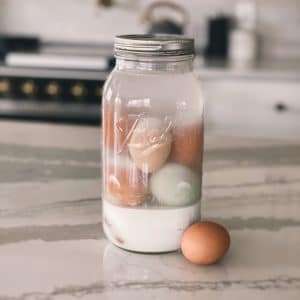
Water Glassing Eggs
Equipment
- 1 Clean container any size from 1 quart to 5 gallons
- 1 Slotted ladle
- 1 Kitchen scale
Ingredients
- 1 oz Picking lime per 1 quart of water
- fresh, clean, unwashed eggs DO NOT use store-bought eggs
- water well, filtered or distillled
Instructions
- Mix 1 oz of pickling lime per 1 quart of water in your container.
- Gently add the eggs to the water glassing solution, leaving 2" of liquid above your eggs. Be careful not to break one, otherwise the whole batch will be spoiled.
- Cover and place your water glassed eggs in storage (cool location out of direct sunlight). They don't need refrigerated!
- Store for 1 year (some say up to 2 years)!
- When you want to use them, wear a dishwashing glove or use a slotted ladle to pull them out one at a time. Gently!
- Rinse the eggs well so there's no lime residue. Then, use them just as you would a fresh egg in the summer.

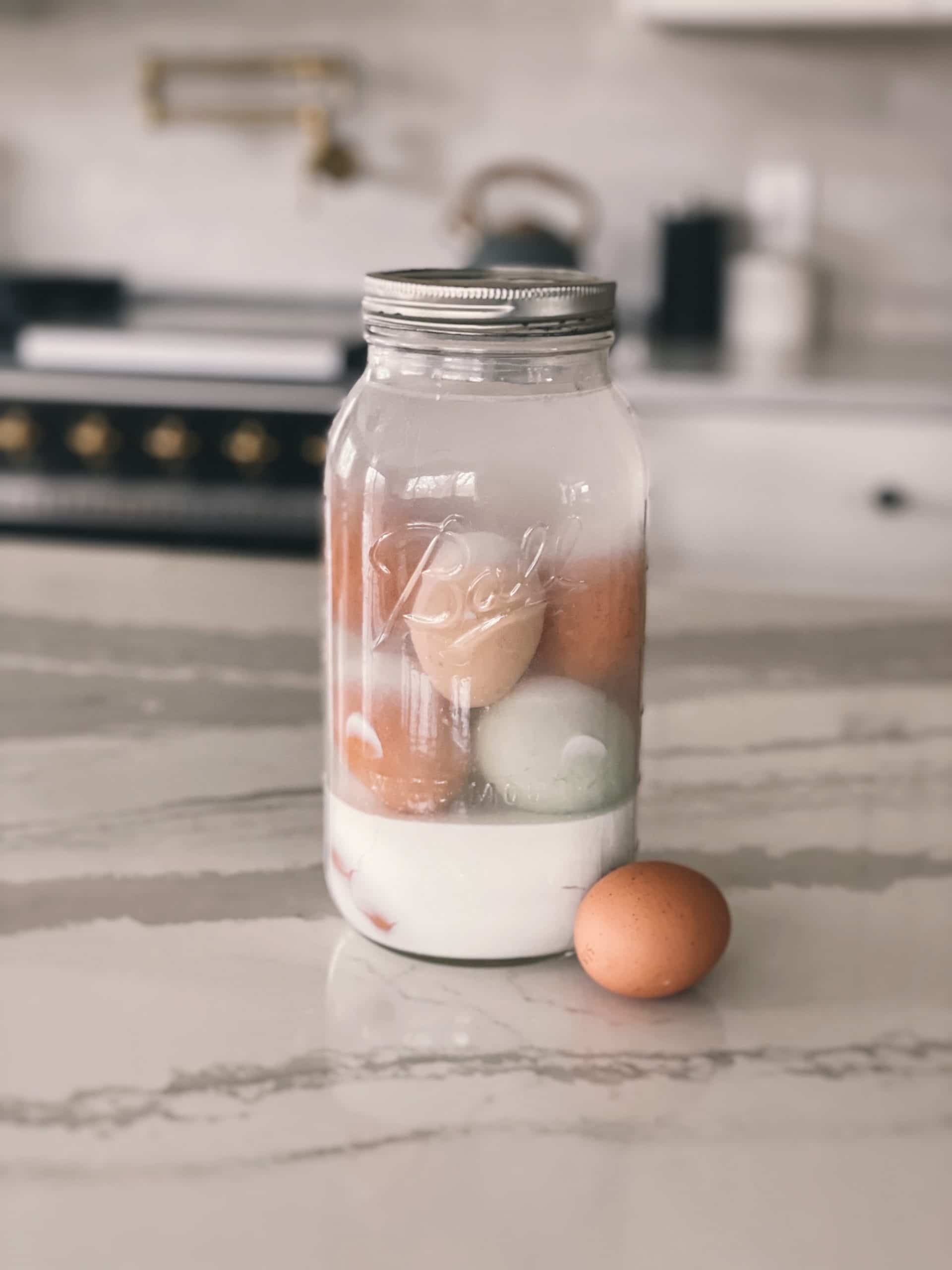
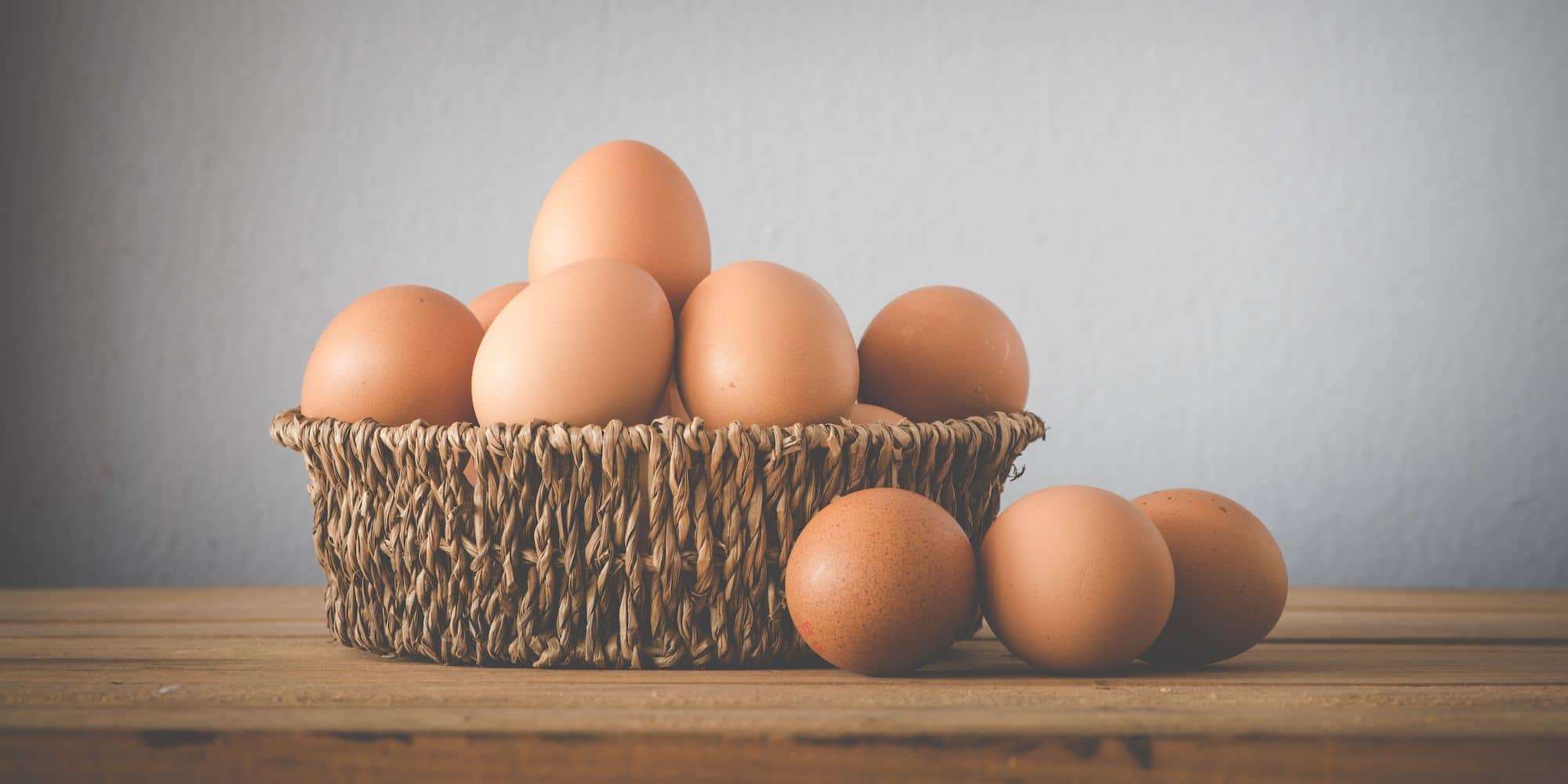







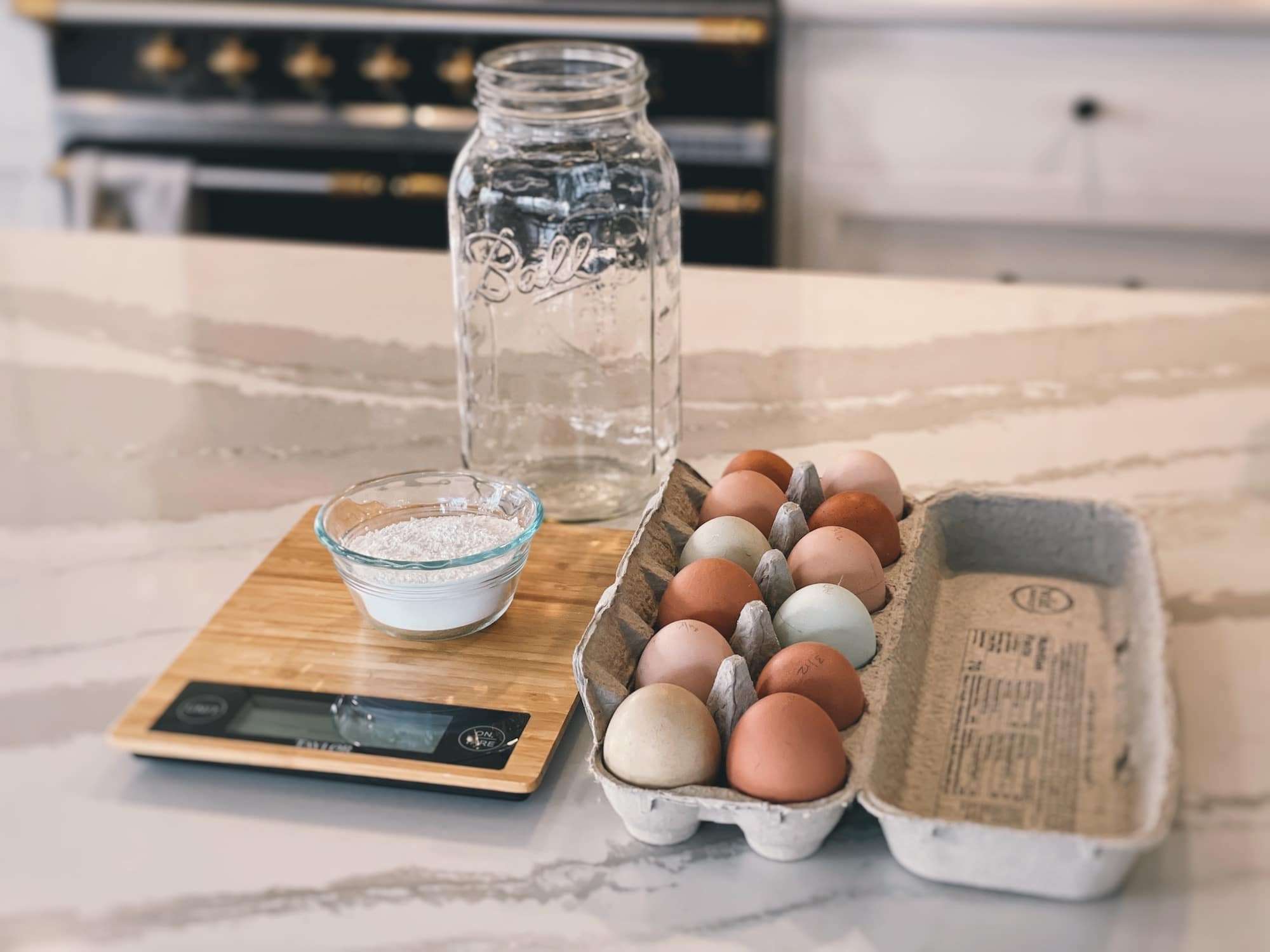
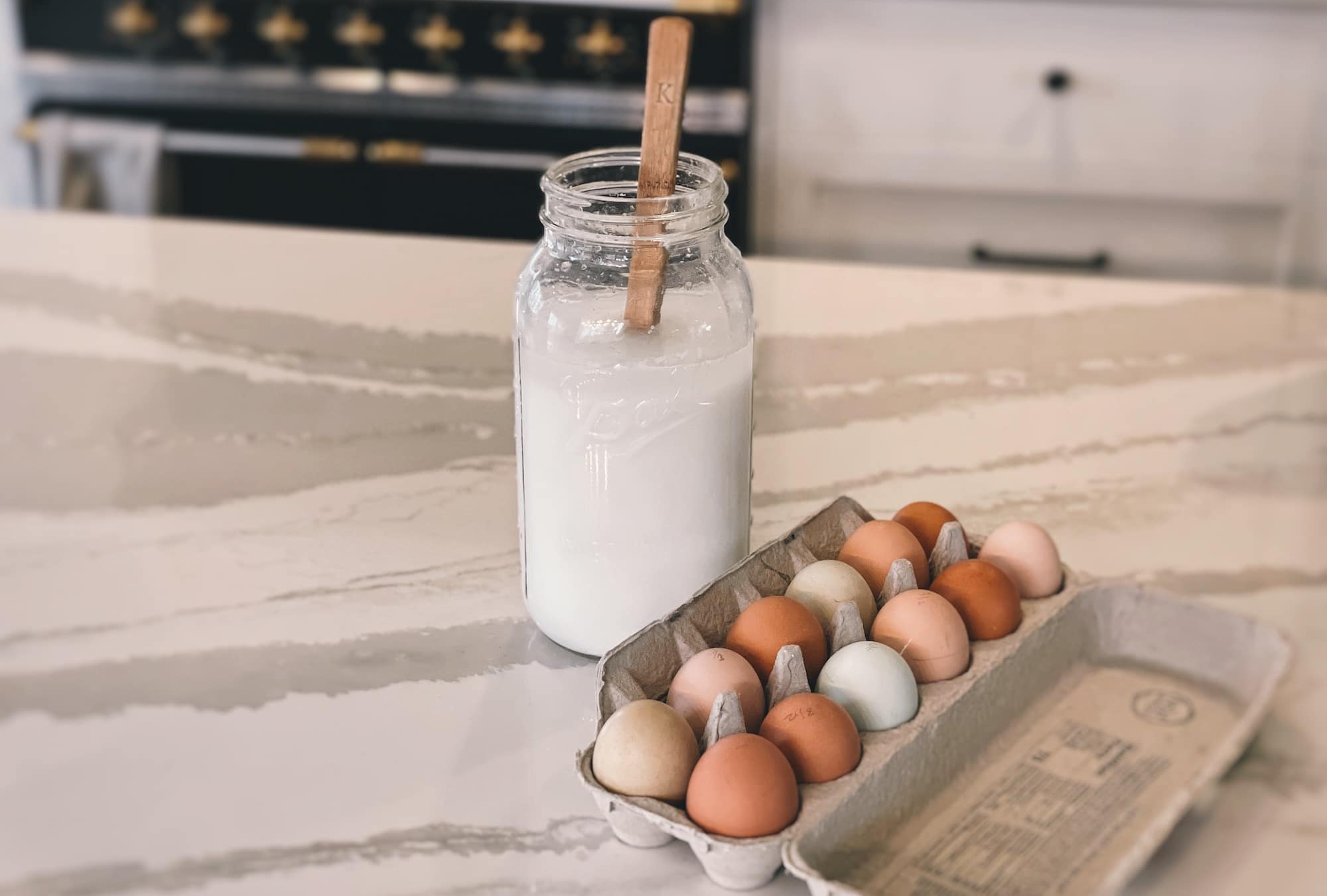
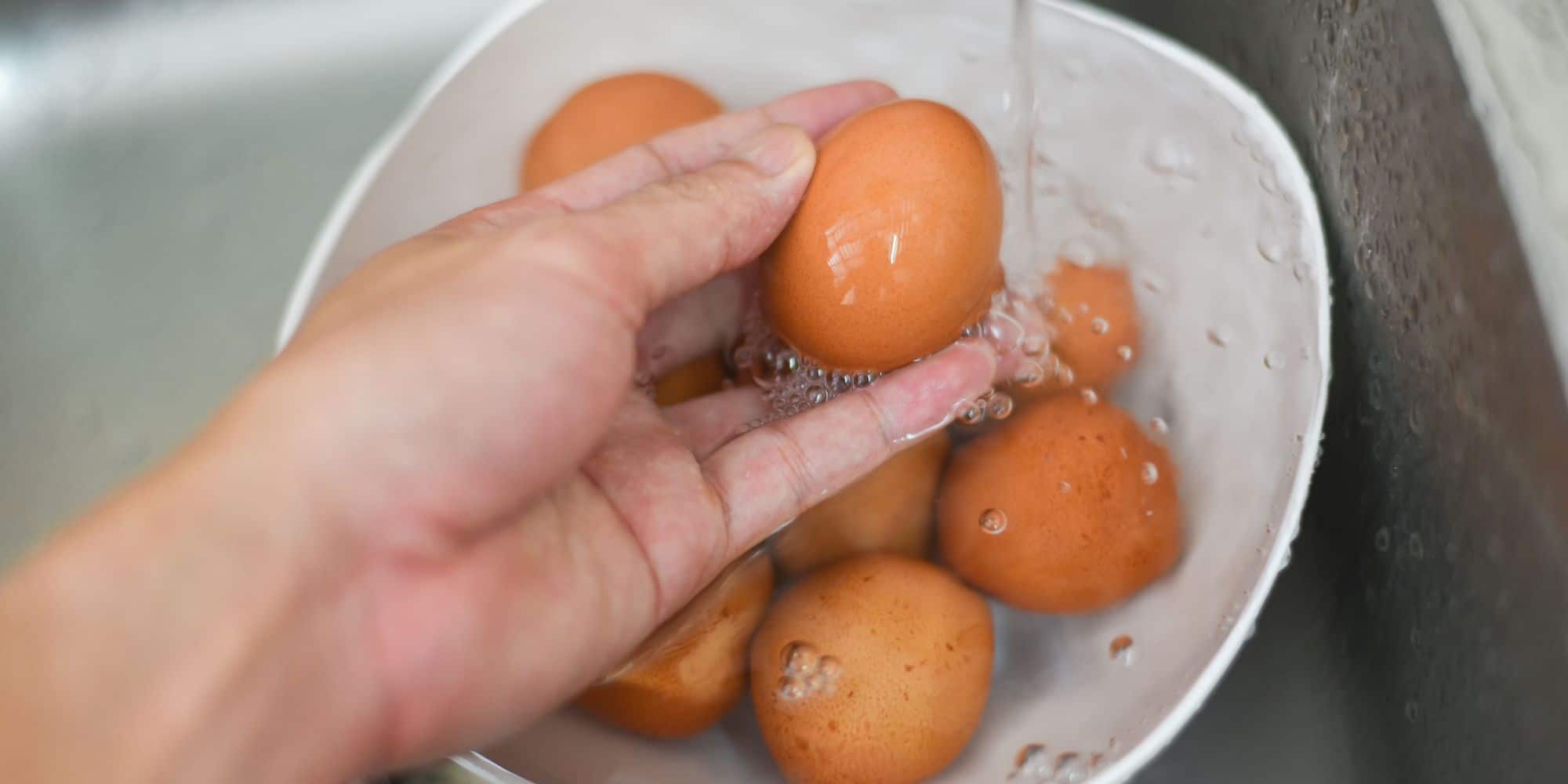

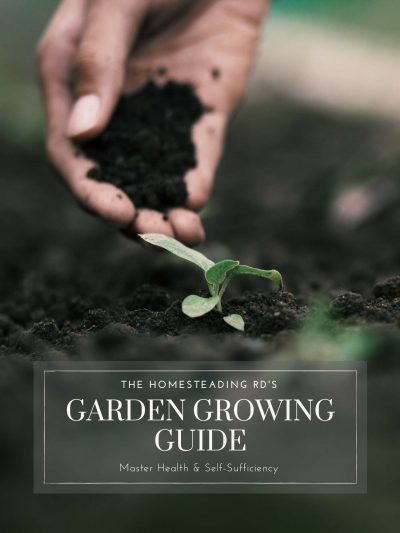
your so welcome thanks
Hi, does it hurt anything if you use a little extra lime?
No, a little extra should be okay but I wouldn’t triple the recipe.
Can you use water glassed eggs when planting tomatoes? I’ve read where adding an egg, shell and all, before placing your tomato start in the garden, is great for your tomatoes.
thanks to all this knowledge acquire im happy to improve
nice blog
If an egg cracks in storage what do I do with the rest of the eggs? Most say not to eat. Could I feed them back to chickens?
If you add fresh eggs in a couple days at a time until the jar is full, do you need to mix the water again after the lime settles or will the water be saturated enough to seal the new eggs placed in?
If I add some eggs later, sometimes I’ll just sprinkle some more lime on top
If I use 5 gallon buckets to water glass my eggs, can I just keep adding to the bucket everyday? I get about 20-22 eggs a day. Wouldn’t you want to use the eggs on the bottom of the bucket first? If so how can you add to daily? Thanks.
That’s what I do! While, yes, it would be great to be able to use the oldest ones first, I just make sure to get through the whole bucket before a year is up.
try this here in germany home my kid and wife loved it
Do I need to change the water and pickling lime once the eggs have been used and I’m collecting again for the next season?
Yes, I would dispose of the solution, clean the container and start fresh for your next batch.
I love this article! I never knew there were so many methods of preserving food and it makes me happy that I can learn to do it myself without having to purchase long-term storable food kits.
Thanks for the awesome job on this! BTW – I’m wondering, can you open and close the mason jar containing the eggs and continue storing it? Or does the container need to be vacuum-sealed and the eggs used (up to a point of time) after opening?
Much gratitude from Alberta, Canada.
Yep – you can open and close it along the way. No problem. I do not vacuum seal the container.
Once you open them to use them where do you keep them ? In the jars or rinse them and put them the fridge ?
Can I reuse the water for a second time
I would make a fresh batch for a second set of eggs
Thanks
Your website is great Katie! Thank you for sharing your information.
Any suggestions on how to have clean eggs without poop on them please?
I highly recommend a rollaway nest! They are so helpful and I love mine. Here’s the one I use: https://amzn.to/3qWx5U4
Thank you so much!
Hey there, just started water glassing this year. I am using a 5 gallon bucket and everything looks to be going ok. I have noticed a crystal like film on top of the water. There isn’t a bad smell and the eggs aren’t floating. Any ideas_
Thanks
That’s totally normal! 🙂
Can i use farn fresh unwashed eggs that have been in egg containers for 3weeks. Thanks from Kentucky.
If they’ve been on the counter for 3 weeks, I probably wouldn’t use them for water glassing since they’ll be at the end of their shelf life to start
I water glassed my chickens unwashed eggs that I had in the refrigerator. I didn’t know that it might be a problem. I put them directly from the refrigerator into the lime water, so they didn’t have a chance to “sweat”. They’be been in the lime water for about a month. I checked one just now with the float test and it passed as fresh by laying flat at the bottom. I will crack it open later and check the smell. The only thing I’m worried about is the lime water somehow absorbing in to the egg because they were refrigerated first.
Hello! The filtered water in my house is alkaline water. Will that be fine for this?
Can you add eggs to the jar then pour liquid over? Or does it have to be liquid then eggs? Doing some for first time.
Either way is completely fine!
What happens if you get an egg that floats to the top?
If it floats, then it is an old or “bad” egg – definitely don’t water glass those!
Looking forward to seeing how my eggs turn out! I am very slowly getting into trying to homestead. Can I water glass eggs if we have a rooster? I collect eggs daily and stored them in a cool area until I put them in the solution (3-5 days later). Also, do they need to be pristine? Sometimes there’s the smallest smudge of poop on them. I’m talking the size of a pencil eraser or less. Thanks!
Yep, you can water glass fertilized eggs! I personally don’t water glass any eggs that have even a small smudge on them. It’s not worth spoiling a whole batch over IMO.
So this winter when I’m ready to use the eggs, do I simply leave them in the jar and pull out the ones I need, or do I get them all out, rinse them, and put them in the fridge? I guess my question is, do they go in the fridge once I open and start removing them from the lime/water?
I just pull out whatever eggs I need for the day from the bucket, put the lid back on the bucket, rinse the eggs I pulled out off and use them right away.
I have been gifted a lot of eggs recently. They have been rinsed of poop and some debris and refrigerated before I received them. Can I water glass them?
No, you cannot use washed or refrigerated eggs for water glassing. Sorry!
I starting glassing eggs but I used a quart jar because I’m glassing small banni eggs. And I don’t have a ton of space to store them. I used the 1oz to 1 quart water. I feel like I just messed up and should just dump it and start over. Please help. I don’t have half gallon jars did I over do it? Can you use too much lime?
The 1 oz of pickling lime to 1 quart of water ratio is correct! Sounds like you did it right to me?
I have a glass mayonnaise jar with a plastic lid. Does the kind of lid matter when waterglassing?
The lid shouldn’t matter as long as the liquid level isn’t so high that it’s touching.
I don’t understand why it one cannot put the eggs in the jar then pour the mixture over them. It would help prevent breakage. Is that possible if you are willing to do the dishes? lol
You can definitely do it that way! I like that idea.
Can I use unwashed eggs that have been in the refrigerator?
Thanks!
I’m sorry, no. They need to be room temp and never refrigerated.
Why can’t you use store bought eggs?
Because the protective bloom coating is washed off
Can water glassed eggs be rinsed off then refrigerated? I would like to be able to bring water glassed eggs to friends around Christmas time for them to eat, but they wouldn’t eat a dozen at a time, so are they safe to store in fridge after rinsing?
Great question and I’m not sure the exact answer, but I would assume that they’d be safe to eat for at least a week in the fridge?
I have started water glassing eggs this year, half a gallon at a time. I have some gallon glass pickle jars I want to use but I do not get enough clean eggs to fill it without them being over a week old. Can I go ahead and put my water and lime mixture in the jar and just add eggs to the solution as I go?
Absolutely! That’s what I do. I use a 5 gallon food-safe bucket and add eggs to it throughout the whole summer 🙂
If I make a batch, can I add some eggs to the mixture? For example if I water glass three dozen and then I want to add more a week or so later, is that possible?
Absolutely! I keep adding eggs to my bucket all summer long 🙂
When you use your water glasses eggs can you just pull them out as you need them (2-3 at a time) or do you need to use the whole bath at once?
You can just pull them out as you need 🙂
I successfully water-glassed eggs last year.
What do you do with the lime water after removing the eggs? Can it be reused for new eggs? If not, is it beneficial for certain plants?
I would not reuse the lime water – I dispose of it in the rocky area behind our building.
My farm fresh unwashed were refrigerated by mistake – can I still water glass – in fridge for 20 hours
I wouldn’t risk it 🙁
I water glassed some eggs in July and checked them today. When I opened the jar I could detect a faint ammonia smell. I am afraid there is a bad egg in that gallon jar. Your thoughts please.
I hope there is an egg test for locating it. I will just dehydrate the ones that are still good if you know what I should do…or maybe just make scrambled eggs for my hens?
Oh no! How does the solution look? If it looks thick or has any tint of yellow, I’d be concerned for the batch. My 5 gallon bucket of eggs is nearly odorless 🙁
This article from the USDA 1917 says, “If satisfactory results are to be obtained, the eggs should be fresh and clean and, if possible, infertile.”
https://archive.org/details/CAT31413310/page/n3/mode/thumb
In order to make sure your eggs are of good quality and infertile; it would be a good idea to candle the eggs before putting them away for later use.
https://archive.org/details/howtocandleeggs565penn/page/n51/mode/2up
Great read! I do have one question! I buy eggs from my local farmer and they are unwashed eggs but they are refrigerated. Is it okay to use unwashed, refrigerated eggs for water glassing? Thank you! 🙂
Hi Kayla, I would not use refrigerated eggs. They will sweat when coming back up to room temp, losing the protective bloom coating in the process. I’d ask your local farmer to see if you can get unrefrigerated eggs 🙂
I just did some eggs. I have a bunch of pickling powder on the bottom of jar. Is this normal? I mixed well before putting eggs in. Should I be concerned?
That’s completely normal! It will naturally settle at the bottom.
I’ve been really impressed about how I can’t tell a difference between fresh and water glassed eggs when I eat my breakfast over-easy eggs! I expected them to have some sort of different taste but they really don’t.
I’m so glad to hear that! It really is a great way to preserve those eggs and enjoy them later 🙂
This website writer does a thorough job of researching her subject. Her photos are great! Helpful information that can’t be found anywhere else.
Thank you so much!! I love researching and educating 🙂
I swear I’m learning new things DAILY because of you! I had NO idea you could do this! Going to try it this weekend!! THANK YOU for the constant, stellar info!
Woo hoo!!! Let me know how it goes! 🙂
I just did some eggs. I have a bunch of pickling powder on the bottom of jar. Is this normal? I mixed well before putting eggs in. Should I be concerned?
Such a great idea if you have an over abundance of eggs!! Thanks for educating me!
Yay! Maybe you can buy extra eggs from me and give this a go! 🙂 hehe
I’ve been using this recipe, and so far, so good! What a great way to preserve extra eggs during the summer!
I’m so glad to hear it! Keep it up!!
So very cool! I had no idea you could do this🙌🏼
I didn’t either until a year ago and now I’m kicking myself for not knowing sooner! 🙂
Okay, my mind is officially blown! Never even thought of this before, but a perfect tip just in time for Easter!
Cool, huh!? I know, I wish I would have known this trick years ago!
Awesome!! I’ve never heard of doing this before. Thanks for the details 🙂
You’re welcome! 🙂
I had no idea! Thanks for sharing this.
You’re welcome and thanks for reading!
I have done this the past 2 years. It works! I only had to buy a dozen each winter. (Most of my grandkids have winter birthdays, so I bake quite a few cakes over winter.) This year I’m using a larger container, as the last grand was born New Year’s Day! (That makes 10!)
Yay!! I’m so glad to hear that you’ve had great success with water glassing. Thank you for sharing!
This is such an interesting egg preservation method. Glad you explained what is pickling lime. Another informative blog. If there is a zombie apocalypse, The Homesteading RD is the house to be. Lol. Thanks for sharing.
I think it’s super interesting, too, and now I wish I would have discovered it sooner! Haha, yup we’re good to go over here 🙂
Thank you for the info. I have been wanting to try his. I have been seeing so many posts about this. Thank you for sharing 🙂
You’re welcome! Let me know what you think when you try it 🙂
Thank you for the information! We’re looking into getting chickens, and I was wondering about the water glassing technique. I had heard about it before, but I love getting the same information from multiple sources. Makes me more confident in trying it out myself!
You’re so welcome! It’ll definitely come in handy once those chickens start laying a lot 🙂